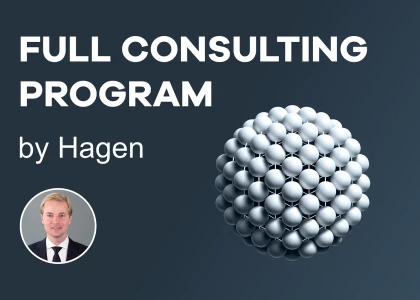I’ve recently gotten a Business Analyst internship offer at McKinsey and was wondering how I can best prepare to succeed ahead of the summer!
For context, I’m studying marketing, and my program includes very few quantitative elements, so my analytical skills are definitely lacking. Are there specific online courses or programs you would recommend to improve in this area? Any other general tips for succeeding in the internship? Thank you!!
How to best prep for my McKinsey internship?


Hi there,
First of all, congratulations on the McKinsey internship offer!
I would be happy to share my thoughts on your situation:
- First of all, while it is great to see how eager you are to prepare for your internship start, I would highly advise you not to worry about it.
- All major consulting firms provide you with excellent onboarding and training that will prepare you for everything you need to know.
- Lastly, if you want to prepare on your own, I would advise you to focus on learning common MS Excel functions as well as MS Excel and PowerPoint shortcuts.
If you would like a more detailed discussion on your specific situation, please don't hesitate to contact me directly.
Best,
Hagen

Hey there,
(1) Go in with enthusiasm and a full set of charged batteries (as in your energy levels), and mindset geared around learning, delivering and growing! So make sure you arrive on Day 1 fresh and ready to make the most of your experience.
(2) To reduce time lost to powerpoint and excel friction during your learning experience, you could definitely learn to be more proficient in those softwares. (You will definitely get tailored training from McKinsey on their ways, but there are some no-regret moves you could make here). There are tons of skill learning videos that can prepare you with a consulting focus.
(3) Network and reach out to consultants there to get office specific advice that could make your life and experience easier (i.e. best Partners / leaders to reach out to for work and mentorship, transport and logistics, etc.)
All the best!

1. High level review of Excel and Powerpoint
2. Catch up on sleep
3. Review your wardrobe and be prepared to travel
4. Read Mckinsey related books (Mckinsey way, etc.)

Hey there!
Congratulations on your McKinsey internship! Having done mine there (incl. offer), I recommend focusing on building some analytical skills with courses in Excel, basic statistics, and data analysis (Coursera/LinkedIn Learning) - in case you don't have them yet. Strengthen mental math and practice breaking down problems using frameworks like MECE. Learn clear, concise communication and familiarize yourself with McKinsey-style slide decks. Read up on industries and consulting topics through McKinsey Insights and The Economist. Stay curious, open to feedback, and focus on relationship-building—it’s as much about growth as contribution. Best of luck! :)
Alessa

Focus on recharging your batteries by doing whatever energizes you so that you’re ready for your first day.
Practice Excel modeling and PowerPoint, but don’t overdo it, as McKinsey’s versions are quite different from the commercial ones.
Take some time to read McKinsey articles and books.
Best,
Alberto

Hey there,
Congrats on the achievement!
If you are interested in preparing for your new role, I'd suggest the following:
When I got the offer some years ago I did the same. I reached out to people I knew in McKinsey and people who interviewed me to ask: what can I do to make the start easier? how can I prepare?
The answer from everyone was: Relax! Enjoy your time before you start and don't think about it. You will figure it out on the job. I followed that advice and it made sense to me once I joined.
When you start at in top tier consulting there are 2 ways to learn:
- Formal training. The formal training sessions/ weeks/ days in the beginning, are nice, however, they are more for networking and meeting your peers. You learn some interesting concepts and get some useful tips from more experienced consultants BUT
- Constant and implicit learning on the job is where it's at. No matter if you are a newcomer or a veteran after 2 years, you will always find yourself on a steep learning curve. As soon as you barely mastered one skill or the skills needed for one level in the hierarchy, you will take care of things, which are expected from a more senior colleague. This cycle never ends. You are expected to learn on the job, learn from your colleagues, your mentors, sometimes even the client. So basically a newly promoted Engagement Manager has the same 'struggle' as a new-hire Business Analyst. They both need to work in a completely new environment and role.
Knowing that, if we now go back to square one in your MBB journey it makes perfect sense to enter the firm with a blank slate with a lot of curiosity and eagerness to soak it all up and quickly learn the ropes.
Nothing matches the experience and the learning and this is a good thing (also the reason why ex-MBBs are valued highly on the job market).
You will learn everything you need to master while doing it. You will be thrown in the cold water and need to swim. However, your colleagues will always be happy to help you and mentor you. And for the rest, you will figure everything out along the way. The key here is always to ask for tips, shortcuts, feedback, etc. Don't be quiet if you get stuck.
Lastly, if you have no domain knowledge about a certain industry or topic, read through the internal library of documentation (which is endless) and call some of the firm experts on the topic. Usually, they are happy to offer you a short call to get you up to speed.
But here’s something extra: Since the question came up ever so often with my clients, I've authored a book titled "Consulting Career Secrets," specifically to guide newcomers like you in navigating this journey. The goal of the book was to answer all typical questions of entry-level consultants and show them the way to make the entry and the transition as simple and painless as possible. While no book or training can entirely prep you for the unique experiences of your first day, week, or project, it offers comprehensive insights to mentally prepare you, suggests essential tools and skills to acquire, shows you the ways how to do that, and strategies to quickly adapt and excel in your new role.
You can DM me if you want to know more. Alternatively, you can find the book on Amazon. It's the most comprehensive guide for new consultants.
In any case, don't sweat the small stuff and enjoy the ride!
Florian














